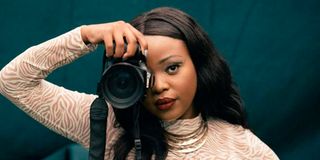Premium
Gathoni Matu: Creatives need information on how exactly the back-end works

What you need to know:
- I started as a photographer, then with time I realised that I needed a format that could allow me to incorporate more content, and that is how I got into documentary filmmaking.
- This is my first project, and hopefully there will be many more. I have worked with many documentary filmmakers who inspired my journey, including Ras Mutabaruka.
- It takes a huge team to produce a documentary and I'm thankful for all involved, and the cast for allowing me to tell their story.
Gathoni, aka Panzigo, is a photographer and filmmaker based in Nairobi. This is her fifth year in the creative space, and she has just released a documentary series on Nairobi’s streetwear culture, available on YouTube. You can find her on Instagram @Panzigo, or at www.panzigo.com.
1.How did you get into photography and filmmaking?
I’ve always had a love for photography and visual arts. When I was growing up, I didn’t know it was something I could explore as a career. But, I decided to take a leap of faith, and it paid off!
I am passionate about telling stories, different stories, and in different mediums. I started as a photographer, then with time I realised that I needed a format that could allow me to incorporate more content, and that is how I got into documentary filmmaking. This is my first project, and hopefully there will be many more. I have worked with many documentary filmmakers who inspired my journey, including Ras Mutabaruka, who is the founder of TAP Magazine, which is the production house that supported the documentary. He was my mentor throughout the process. It takes a huge team to produce a documentary and I'm thankful for all involved, and the cast for allowing me to tell their story.
I have a degree in journalism and political science, so I haven’t studied film making. I believe that when you have the passion, and are constantly practicing and learning, you can really grow your craft. Most of my technical skills are self-taught.
2.This is your first documentary. Why do you think documentaries are an important tool, or art form? Why did you choose streetwear as your theme?
Documentaries shine a light on crucial information that people might otherwise not be exposed to. More people can connect with current affairs, be it the streetwear culture in Nairobi, or something else. Documenting the bubbling creative scene in Kenya in this form gives us a chance to connect with the rest of the world, and allows us to amplify our own stories and drive own our narrative.
As someone who actively consumes Kenyan fashion trends, including the streetwear culture, I was amazed by the designers and fashion entrepreneurs – their work, the strides they’ve made, and their passion. I see them in their space, and in the communities that they nurture and grow. I also see how important it is for young people today. I just wanted to put that bubbling underground creative scene on the map, on a screen. And that is the power of documentaries.
3.Your project was screened at Unseen Nairobi. How easy or hard is it for creatives to get their films viewed by a wider, curious, and receptive audience? How did you get your project screened?
That is a huge challenge in the creative industry, and I’ve been trying to understand how that works. It is actually one of the reasons I had not done this until now. There is a gap in understanding the world of funding, of pitching and amplifying your projects. Creatives need information on how exactly the back-end works. I think that’s a huge barrier to many. There are systems that we are not exposed to. However, I can see that things are changing, and I hope the creative ecosystem creates more opportunities, because there are so many talented people who don’t know how to get into the ecosystem.
I accessed the information by being nosy! And also, realising that I had that gap in my knowledge. As I said, I also looked for people in the industry who were a bit more experienced, people who could mentor me.
4.Are you exploring more with this project, or are you ready to move onto your next one?
The plan was to show the film at Unseen and give people a chance to discuss, and talk directly to the cast members whose stories I showed in the four episodes: Luca, who runs Luca Store Kenya; Akiba, who is part of the pioneering collective called Studio 18; Mvoo, the designer behind the brand Bonkers; and Daudi, who runs Metamorphosized, and who is also a part of Studio 18. It is a very personal project.
The screening was meant to create an opportunity for questions and dialogue around the work of the cast. The documentary is live on YouTube as Nairobi Streetwear Fashion. I am currently open to opportunities and collaborations to give it a bigger platform. I do hope to produce more documentary features, and get more exploratory. This isn’t the last project!
5.What’s the last great thing you watched that you didn’t make?
A short film from a Kenyan woman filmmaker, Natasha Ayoo, called Red Blues. The cinematography and her exploration of self-love is captivating.





